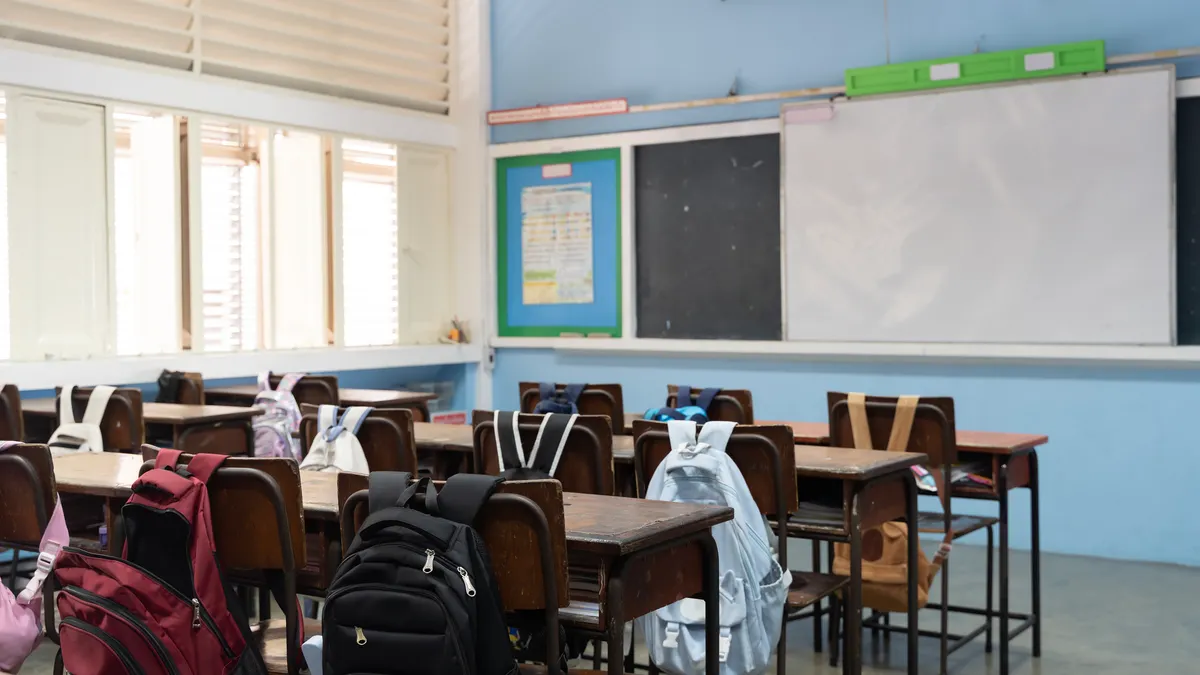Dive Brief:
- California's Black, foster and homeless student populations are experiencing persistent and widespread discipline disparities despite state reforms to reduce inequities, a new report from the National Center for Youth Law said.
- The report found that students in the foster system lost 76.6 days of instruction per 100 students enrolled in 2023-24 due to out-of-school suspensions — seven times the statewide average for all students of 10.7 days lost per 100 students. And in many districts, the suspension gap between Black and White students has increased significantly over the past seven years.
- NCYL warns that discipline disparities could widen even more as the Trump administration seeks to eliminate school discipline practices meant to address racial inequity for historically marginalized student populations.
Dive Insight:
NCYL's analysis of discipline data in California shows that while some districts have made progress in reducing disparities, many continue to suspend and expel students at disproportionately high rates.
For example, students experiencing homelessness lost 29.1 days because of out-of-school suspensions per 100 students enrolled in 2023-24. Students with disabilities lost 23.4 days of instruction per 100 students enrolled the same school year, which is nearly three times higher than students without disabilities, according to the report.
Black foster youth had the highest disproportionate discipline rate with 121.8 days per 100 students enrolled due to out-of-school suspensions. That's 15 times the rate of lost instruction for all enrolled Whites students, which was 7.9 lost days per 100 students.
The report's analysis pulls from discipline data between the 2017-18 and 2023-24 school years. California doesn't publicly report on the number of school days lost by offense category. Rather, NCYL developed the metric to compare rates across districts, over time and between student groups, the report said.
Additionally, NCYL's data analysis shows that most suspensions are for minor misconduct that did not involve injury, such as the use of profanity or vulgarity. The 2024-25 school year was the first in which no suspensions were allowed for willful defiance in grades K-12 in California, although the policy had been phased in for younger grades in the years before.
The report recommends that the state disaggregate discipline data for the offenses with the highest rates so the public can see which are for violent and nonviolent behaviors. Currently, most suspensions in California schools, even for profanity and vulgarity offenses, can be reported under a category titled "violent incident, no injury," which can be misleading, NCYL said.
When most suspensions are reported under the category of 'violent incident, no injury' or 'violent incident, injury' people will assume the offenses were violent, but they could be mostly profanity and vulgarity, said Dan Losen, co-author of the report and senior director for education at NCYL.
"Don't call obscenity violence. It's not violent," Losen said. "These very subjective determinations about what's profanity, what's vulgarity, what's obscene, what's not obscene is fertile ground for implicit racial bias."
The report highlights several California districts making improvements in reducing discipline disparities. Merced Union High District, for instance, has reduced its rate of lost instruction from 58.3 days per 100 Black students in 2017-18, to 8.8 days per 100 Black students in 2023-24. Lost instruction days for students with disabilities went from 32 in 2017-18 to 6.1 in 2023-24 per 100 students with disabilities.
The report credited the reductions in lost instruction to the district's efforts at problem-solving rather than punitive measures and for providing student supports like individualized interventions and behavioral services.
NCYL recommends several statewide initiatives to reduce discipline disparities, including strengthening state civil rights enforcement and oversight of district discipline practices, as well as expanding support for students in the foster system, students experiencing homelessness, and students with disabilities.
However, statewide reforms in California could be in jeopardy under the Trump administration's efforts to stamp out diversity, equity and inclusion programs nationally, the report said. Such state reforms have included a ban on suspensions for willful defiance in grades K-12 and the explicit inclusion of school discipline in the California Department of Education’s statewide accountability system.
Specifically, the report points to a White House executive order issued in April that calls for a stop to "unlawful 'equity' ideology" in school discipline. The order requires the U.S. Department of Education to issue guidance on states' and districts' obligations "not to engage in racial discrimination under Title VI in all contexts, including school discipline.”
Critics of equity-based discipline policies say they hamper school safety.
Title VI of the Civil Rights Act prohibits discrimination based on race, color or national origin in federally funded programs.
The federal discipline guidance required by Trump's executive order has not yet been issued, and the Education Department did not respond to inquiries about its status. While discipline policies are typically set at the school, district or state levels, the federal government can issue guidance and investigate schools for discriminatory practices under Title VI.
The civil rights law has historically been invoked to protect the rights of historically marginalized students, including when they are overrepresented in school discipline — and especially exclusionary discipline — data. However, the current administration has used the law to protect White and Asian students, sometimes at the expense of DEI efforts meant to level the playing field for those historically marginalized groups.
"One should expect that, soon, all student groups that have experienced unjustifiably high rates of removal will be excluded from educational opportunities on disciplinary grounds even more often," the NCYL report said.







 Dive Awards
Dive Awards






